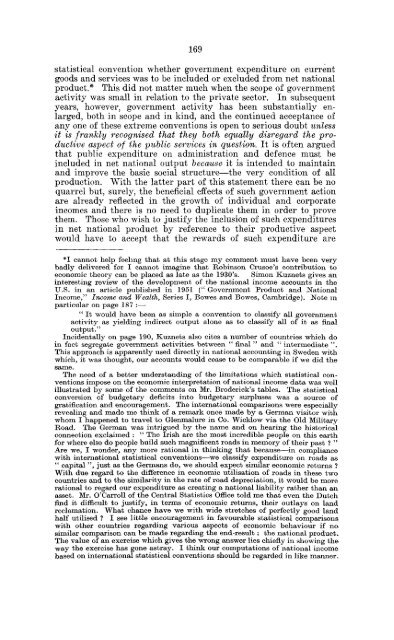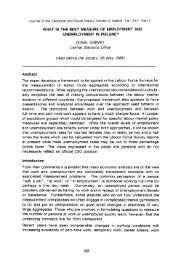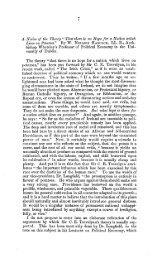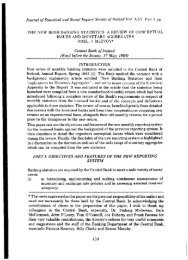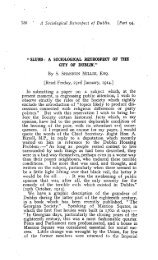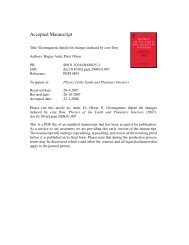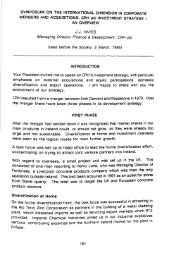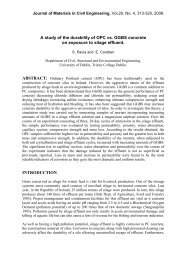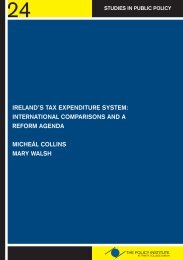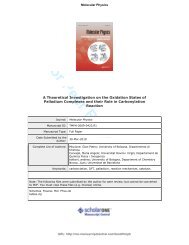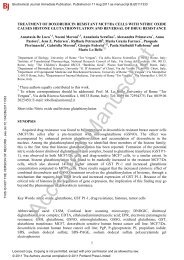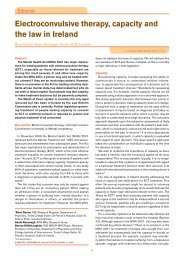An Analysis of Government Revenue and Expenditure in ... - TARA
An Analysis of Government Revenue and Expenditure in ... - TARA
An Analysis of Government Revenue and Expenditure in ... - TARA
You also want an ePaper? Increase the reach of your titles
YUMPU automatically turns print PDFs into web optimized ePapers that Google loves.
169<br />
statistical convention whether government expenditure on current<br />
goods <strong>and</strong> services was to be <strong>in</strong>cluded or excluded from net national<br />
product.* This did not matter much when the scope <strong>of</strong> government<br />
activity was small <strong>in</strong> relation to the private sector. In subsequent<br />
years, however, government activity has been substantially enlarged,<br />
both <strong>in</strong> scope <strong>and</strong> <strong>in</strong> k<strong>in</strong>d, <strong>and</strong> the cont<strong>in</strong>ued acceptance <strong>of</strong><br />
any one <strong>of</strong> these extreme conventions is open to serious doubt unless<br />
it is frankly recognised that they both equally disregard the productive<br />
aspect <strong>of</strong> the public services <strong>in</strong> question. It is <strong>of</strong>ten argued<br />
that public expenditure on adm<strong>in</strong>istration <strong>and</strong> defence must be<br />
<strong>in</strong>cluded <strong>in</strong> net national output because it is <strong>in</strong>tended to ma<strong>in</strong>ta<strong>in</strong><br />
<strong>and</strong> improve the basic social structure—the very condition <strong>of</strong> all<br />
production. With the latter part <strong>of</strong> this statement there can be no<br />
quarrel but, surely, the beneficial effects <strong>of</strong> such government action<br />
are already reflected <strong>in</strong> the growth <strong>of</strong> <strong>in</strong>dividual <strong>and</strong> corporate<br />
<strong>in</strong>comes <strong>and</strong> there is no need to duplicate them <strong>in</strong> order to prove<br />
them. Those who wish to justify the <strong>in</strong>clusion <strong>of</strong> such expenditures<br />
<strong>in</strong> net national product by reference to their productive aspect<br />
would have to accept that the rewards <strong>of</strong> such expenditure are<br />
*I cannot help feel<strong>in</strong>g that at this stage ray comment must have been very<br />
badly delivered for I cannot imag<strong>in</strong>e that Rob<strong>in</strong>son Crusoe's contribution to<br />
economic theory can be placed as late as the 1930's. Simon Kuznets gives an<br />
<strong>in</strong>terest<strong>in</strong>g review <strong>of</strong> the development <strong>of</strong> the national <strong>in</strong>come accounts <strong>in</strong> the<br />
U.S. <strong>in</strong> an article published <strong>in</strong> 1951 (" <strong>Government</strong> Product <strong>and</strong> National<br />
Income," Income <strong>and</strong> Wealth, Series I, Bowes <strong>and</strong> Bowes, Cambridge). Note m<br />
particular on page 187 :—-<br />
" It would have been as simple a convention to classify all government<br />
activity as yield<strong>in</strong>g <strong>in</strong>direct output alone as to classify all <strong>of</strong> it as f<strong>in</strong>al<br />
output."<br />
Incidentally on page 190, Kuznets also cites a number <strong>of</strong> countries which do<br />
<strong>in</strong> fact segregate government activities between " f<strong>in</strong>al " <strong>and</strong> " <strong>in</strong>termediate ".<br />
This approach is apparently used directly <strong>in</strong> national account<strong>in</strong>g <strong>in</strong> Sweden with<br />
which, it was thought, our accounts would cease to be comparable if we did the<br />
same.<br />
The need <strong>of</strong> a better underst<strong>and</strong><strong>in</strong>g <strong>of</strong> the limitations which statistical conventions<br />
impose on the economic <strong>in</strong>terpretation <strong>of</strong> national <strong>in</strong>come data was well<br />
illustrated by some <strong>of</strong> the comments on Mr. Broderick's tables. The statistical<br />
conversion <strong>of</strong> budgetary deficits <strong>in</strong>to budgetary surpluses was a source <strong>of</strong><br />
gratification <strong>and</strong> encouragement. The <strong>in</strong>ternational comparisons were especially<br />
reveal<strong>in</strong>g <strong>and</strong> made me th<strong>in</strong>k <strong>of</strong> a remark once made by a German visitor with<br />
whom I happened to travel to Glenmalure <strong>in</strong> Co. Wicklow via the Old Military<br />
Road. The German was <strong>in</strong>trigued by the name <strong>and</strong> on hear<strong>in</strong>g the historical<br />
connection exclaimed : " The Irish are the most <strong>in</strong>credible people on this earth<br />
for where else do people build such magnificent roads <strong>in</strong> memory <strong>of</strong> their past ? J><br />
Are we, I wonder, any more rational <strong>in</strong> th<strong>in</strong>k<strong>in</strong>g that because—<strong>in</strong> compliance<br />
with <strong>in</strong>ternational statistical conventions—we classify expenditure on roads as<br />
" capital ", just as the Germans do, we should expect similar economic returns ?<br />
With due regard to the difference <strong>in</strong> economic utilisation <strong>of</strong> roads <strong>in</strong> these two<br />
countries <strong>and</strong> to the similarity <strong>in</strong> the rate <strong>of</strong> road depreciation, it would be more<br />
rational to regard our expenditure as creat<strong>in</strong>g a national liability rather than an<br />
asset. Mr. O'Carroll <strong>of</strong> the Central Statistics Office told me that even the Dutch<br />
f<strong>in</strong>d it difficult to justify, <strong>in</strong> terms <strong>of</strong> economic returns, their outlays on l<strong>and</strong><br />
reclamation. What chance have we with wide stretches <strong>of</strong> perfectly good l<strong>and</strong><br />
half utilised ? I see little encouragement <strong>in</strong> favourable statistical comparisons<br />
with other countries regard<strong>in</strong>g various aspects <strong>of</strong> economic behaviour if no<br />
similar comparison can be made regard<strong>in</strong>g the end-result ; the national product.<br />
The value <strong>of</strong> an exercise which gives the wrong answer lies chiefly <strong>in</strong> show<strong>in</strong>g the<br />
way the exercise has gone astray. I th<strong>in</strong>k our computations <strong>of</strong> national <strong>in</strong>come<br />
based on <strong>in</strong>ternational statistical conventions should be regarded <strong>in</strong> like manner.


